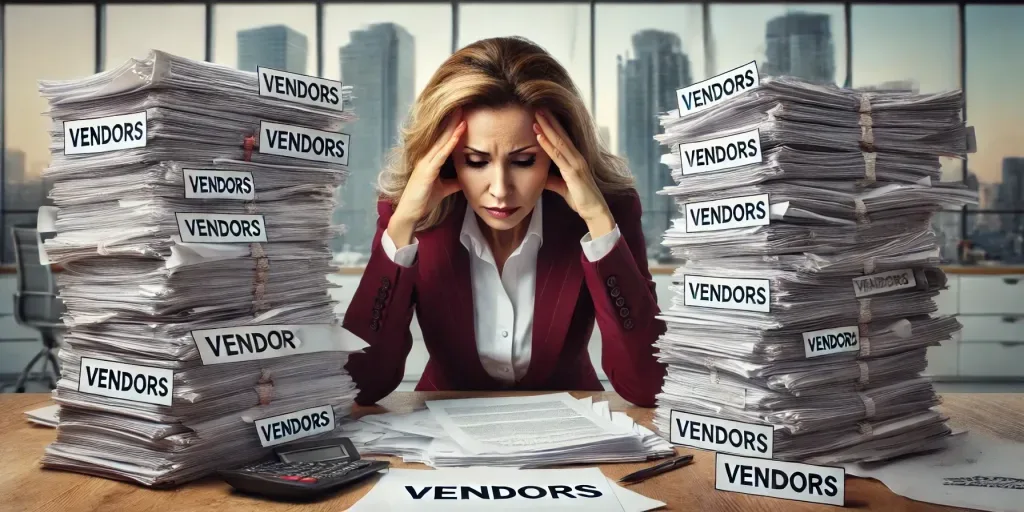

Overcoming Decision Paralysis in Business: How to Choose the Right Vendor and Keep Your Company Moving Forward
Posted October 9, 2024 by Kevin Chern
In the world of business, the stakes are always high when it comes to choosing strategic partners and vendors. A wrong decision can lead to significant financial losses, operational inefficiencies, and reputational damage. But what happens when the fear of making the wrong choice becomes so overwhelming that business owners and decision-makers find themselves frozen, unable to make any decision at all? This phenomenon, often referred to as decision paralysis, is a common but detrimental issue that can stagnate or even paralyze business growth.
Understanding Decision Paralysis: The Fear of Choosing the Wrong Vendor
Decision paralysis occurs when the sheer weight of a decision causes indecision, often leading to delayed or completely avoided choices. This can be especially prevalent in vendor or partner selection, where the impact of a wrong choice can feel immense. Business owners are understandably concerned about factors like costs, quality, reliability, and long-term compatibility. Unfortunately, this anxiety can sometimes manifest in a reluctance to make a decision at all.
The psychological impact of decision paralysis is well-documented in behavioral economics. When faced with too many choices or overwhelming stakes, humans tend to either avoid the decision entirely or default to maintaining the status quo. In business, this can manifest as the inability to select the right vendor, partner, or service provider—a decision that is often crucial for future growth and competitiveness.
The Consequences of Decision Paralysis in Vendor Selection
Failing to make decisions can have far-reaching consequences. Some of the negative outcomes of decision paralysis in business include:
- Stagnated Business Growth: Inaction can lead to missed opportunities for innovation, expansion, or process improvements. The inability to choose a new vendor for essential services such as software, logistics, or marketing could result in the business falling behind its competitors.
- Missed Operational Efficiency Gains: Many vendors provide services and products that streamline operations, lower costs, and enhance productivity. Delaying vendor selection means delaying these benefits. For example, a company that delays choosing a new technology vendor may miss out on efficiency-enhancing software that could have automated manual tasks and improved accuracy.
- Increased Costs: Indecision can cause existing problems to persist or worsen. For example, sticking with an ineffective vendor because of decision paralysis can lead to higher operational costs or missed revenue opportunities. Over time, this can erode profit margins and create additional financial burdens.
- Loss of Competitive Advantage: In fast-paced industries, agility is a key competitive advantage. When businesses are unable to make timely decisions about strategic partners or vendors, they risk losing ground to more decisive competitors who are quick to adapt to changes in technology, customer preferences, or market conditions.
- Team Frustration: Decision paralysis can lead to frustration and confusion within the organization. When employees see leadership unable or unwilling to make decisions, it can erode trust and morale, potentially leading to disengagement, poor performance, and increased turnover.
How to Overcome Decision Paralysis and Restore Momentum
The good news is that decision paralysis is not insurmountable. Businesses can regain “movement” and “limberness” in their decision-making processes by adopting some best practices. Here’s how companies can break free from indecision and make confident, strategic choices when selecting vendors and partners.
1. Build a Strong Vendor Selection Process
One of the main reasons for decision paralysis is the lack of a structured decision-making process. When faced with numerous options and high stakes, it can be easy to feel overwhelmed and unsure where to start. Building a strong, standardized vendor selection process can help eliminate much of this uncertainty.
Here’s how to do it:
- Define Your Requirements Clearly: Before even beginning to evaluate vendors, businesses must clearly define their requirements. What problem are you trying to solve? What are the specific features, services, or capabilities that you need? By narrowing down your exact needs, you can eliminate vendors that don’t meet the basic criteria and avoid being distracted by unnecessary features or services.
- Prioritize Your Criteria: Not every requirement carries equal weight. Businesses should rank their criteria in order of importance. For example, is cost your top priority, or is it more important to find a vendor with a proven track record of reliability? By establishing priorities, you can evaluate vendors more efficiently.
- Use a Scoring System: Once your requirements and priorities are defined, implement a scoring system to objectively evaluate potential vendors. Assign points to each vendor based on how well they meet your requirements. This system can help cut through the noise and provide a clear picture of which vendor is the best fit.
2. Conduct Thorough Due Diligence
One of the biggest causes of decision paralysis is uncertainty about a vendor’s reliability, quality, or long-term viability. Conducting thorough due diligence can help alleviate this uncertainty by providing concrete data on which to base your decision.
Due diligence can include:
- Requesting References: Ask potential vendors for a list of references, ideally from businesses in your industry or with similar needs. Talking to these references can provide valuable insight into the vendor’s performance, customer service, and ability to deliver on promises.
- Evaluating Financial Health: Check the vendor’s financial stability. A financially unstable vendor could go out of business or become unable to provide services, leading to disruptions down the line.
- Reviewing Case Studies: Many vendors offer case studies that showcase how they’ve solved problems for other companies. These case studies can provide insight into how the vendor approaches challenges and whether they’ve successfully delivered results for similar clients.
- Testing Their Service: If possible, start with a small pilot project to test the vendor’s service or product in a low-risk environment. This allows you to assess the vendor’s capabilities and compatibility with your business before committing to a long-term contract.
3. Avoid Being Lazy in Vendor Selection
Another factor that can contribute to decision paralysis is laziness or complacency in the selection process. It’s tempting to default to the status quo or choose the most familiar option to avoid the effort of evaluating multiple vendors. However, this approach can lead to poor decisions that have long-term consequences.
To avoid falling into this trap:
- Keep Your Options Open: Even if you’re happy with your current vendor, it’s always a good idea to evaluate other options. The market is constantly evolving, and new vendors or solutions may offer better value, service, or innovation than your existing provider.
- Involve a Cross-Functional Team: Vendor selection shouldn’t be the responsibility of just one person or department. Involving representatives from different functions (e.g., finance, operations, IT) ensures that all perspectives are considered, and no critical factors are overlooked. This also helps to spread the decision-making burden and prevent individuals from becoming overwhelmed.
4. Learn from Bad Experiences
Every business has had a bad experience with a vendor at some point. Whether it’s a missed deadline, poor quality, or lack of communication, these negative experiences can create a fear of making future mistakes. However, instead of letting these experiences paralyze your decision-making, view them as valuable learning opportunities.
Bad experiences with vendors can provide insight into what to avoid in the future. For example, if you’ve worked with a vendor that consistently failed to meet deadlines, you’ll know to prioritize vendors with strong project management capabilities in your next selection process. Similarly, if a vendor provided poor customer support, you’ll learn to place greater emphasis on responsiveness and communication.
Use past experiences to refine your vendor selection criteria and improve your due diligence process. With each selection, your business will become more adept at identifying red flags and choosing vendors that align with your needs and expectations.
5. Work with Experts in Vendor Selection
For complex or high-stakes decisions, businesses should consider working with experts who specialize in vendor selection. These professionals bring a wealth of experience and knowledge to the table, helping businesses make informed, confident decisions.
The type of expert you select may depend on your industry. For example:
- Manufacturing: In the manufacturing industry, selecting vendors for raw materials, machinery, or logistics services can have a major impact on production efficiency and cost control. Experts in supply chain management, procurement, or lean manufacturing can provide valuable guidance on how to select vendors that will support your production goals and drive operational efficiency.
- Services Industry: For businesses in the services industry, the focus may be on selecting vendors for technology, software, or outsourced services. Here, IT consultants, project management professionals, or business strategy experts can help you evaluate vendors for scalability, integration, and customer service.
In either case, these experts can help guide you through the vendor selection process, ensuring that you consider all the relevant factors and avoid common pitfalls. They can also facilitate negotiations and help you structure contracts that protect your business interests.
6. Set Clear Deadlines for Decisions
One effective way to combat decision paralysis is by setting clear deadlines for making a decision. Without a defined timeline, it’s easy for decision-making to drag on indefinitely. Establish a realistic deadline for when you need to have a vendor selected, and hold yourself (or your team) accountable to that deadline.
Deadlines create a sense of urgency and help prioritize the decision-making process. They also ensure that decisions are made in a timely manner, allowing the business to move forward and avoid stagnation.
7. Balance Risk with Reward
It’s important to remember that no decision is completely risk-free. Every vendor relationship carries some degree of risk, but that shouldn’t prevent you from making a choice. Instead of focusing solely on the risks, consider the potential rewards of making a decision. By balancing the two, you can make a more informed decision that considers both the risks and the benefits.
Additionally, not all decisions are final. In some cases, you can mitigate risk by negotiating short-term contracts or performance-based agreements.
Tags:




